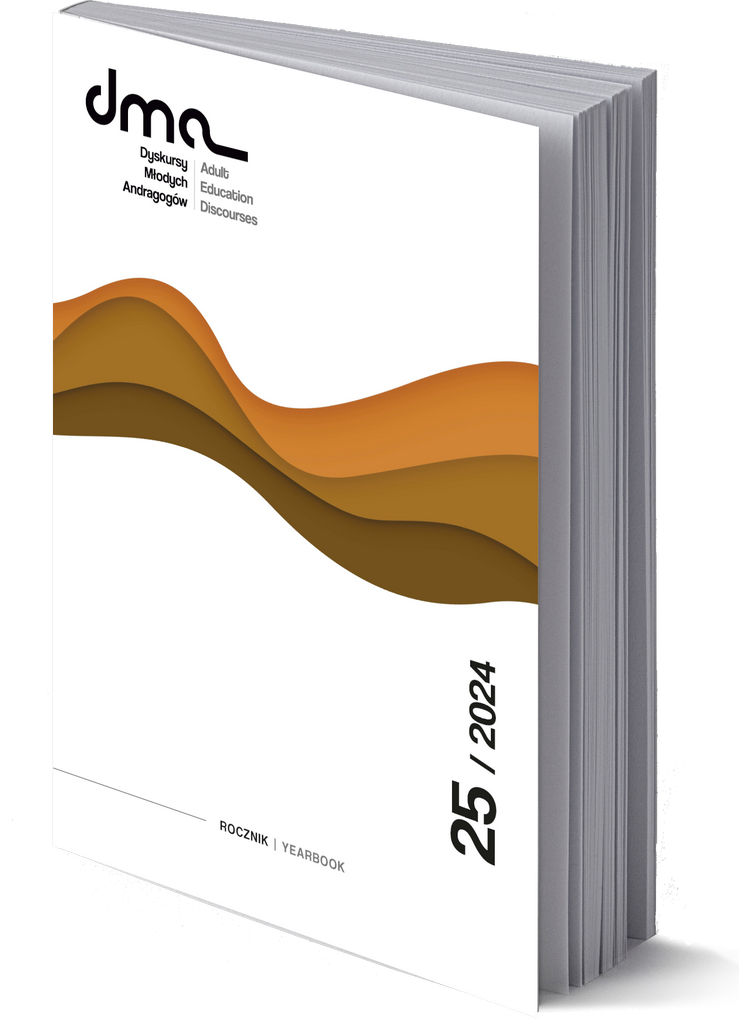Abstrakt
This article is an attempt to look at the concept of ‘good preparation’ for conducting research (especially qualitative research, but not only) and to answer the question: what does ‘good preparation’ for research mean? The inspiration to take up this issue was the author’s belief that too little is written and said about the challenges that may arise during the design and implementation of research. In this paper, the author uses her own research experience, which she gained while working on her doctoral dissertation. She describes the different stages of her work, particularly emphasizing the challenges and difficulties she had to face. The content of the article shows how her approach to ‘good preparation’ for conducting research has changed. Ultimately, the author indicates that one of the possible, perhaps most useful answers to the question from her perspective is that ‘good preparation’ for research means learning the art of practicing patience, being open to changing assumptions and accepting the possible need to look for other solutions. The author would like this article to be understood as an invitation to exchange experiences.
Bibliografia
Bampton, R. & Cowton, Ch.J. (2002) The E-Interview. Forum: Qualitative Social Research[online], 3(2). Available at: https://doi.org/10.17169/fqs-3.2.848.
Batorski, D. & Olcoń-Kubicka. M. (2006) Prowadzenie badań przez Internet – podstawowe zagadnienia metodologiczne. Studia Socjologiczne, 3(182), 99-132.
Binder, P. (2022) Wywiady online w badaniach jakościowych okresu pandemii: inkluzywny potencjał, zagrożenie wykluczeniem i jakość gromadzonych danych. Kultura i Edukacja [online], 3(137), 38-62. Available at: https://doi.org/10.15804/kie.2022.03.03.
Cockerham, W.C. & Scambler, G. (2010) Medical Sociology and Social Theory. In: W.C. Cockerham (ed.) The New Blackwell Companion to Medical Sociology. Oxford: Wiley-Blackwell, 3-26.
Cousineau, C.T. & Domar, A.D. (2007) Psychological impact of infertility. Best Practice & Research Clinical Obstetrics and Gynaecology[online], 21(2), 293-308. Available at: https://doi.org/10.1016/j.bpobgyn.2006.12.003.
Curasi, C.F. (2001) A critical exploration of face-to-face interviewing vs. computer-mediated interviewing. International Journal of Market Research, 43(4), 361-375.
Greil, A.L. & McQuillan, J. (2004) Help-Seeking Patterns among Subfecund Women. Journal of Reproductive and Infant Psychology, 44(4), 305-319.
Greil, A.L., McQuillan, J. & Slauson‐Blevins, K. (2011) The social construction of infertility. Sociology Compass [online], 5(8), 736-746. Available at: https://doi.org/ 10.1111/j.1751-9020.2011.00397.x.
Hofmann, B. (2002) On the Triad Disease, Illness and Sickness. Journal of Medicine and Philosophy [online], 27(6), 651-673. Available at: https://doi.org/10.1076/jmep. 27.6.651.13793.
Jacob, M.C., McQuillan, J. & Greil, A.L. (2007) Psychological distress by type of fertility barrier. Human Reproduction [online], 22(3), 885-894. Available at: https://doi.org/10.1093/humrep/del452.
James, N. & Busher, H. (2009) Online Interviewing. London: Sage Publications.
Joinson, A.N. (2001) Self-disclosure in computer-mediated communication: The role of selfawareness and visual anonymity. European Journal of Social Psychology [online], 31(2), 177-192. Avaible at: https://doi.org/10.1002/ejsp.36.
Kalinowska, K., Bielska, B., Męcfal, S. & Surmiak, A. (2022) Czy badać? Co badać? Jak badać? Strategie badawcze w naukach społecznych i humanistycznych w pierwszej fali pandemii COVID-19. Przegląd Socjologii Jakościowej [online], 18(4), 34-59. Available at: https://doi.org/10.18778/1733-8069.18.4.02.
Kivits, J. (2005) Online Interviewing and the Research Relationship. In: Ch. Hine (ed.) Virtual Methods: Issues in Social Research on the Internet.Oxford: Oxford University Press, 35-50.
Meho, L.I. (2006) E-Mail Interviewing in Qualitative Research: A Methodological Discussion. Journal of American Society for information Science and Technology [online], 57, 1284-1295. Available at: https://doi.org/10.1002/asi.20416.
Miller, P. (2012) Wprowadzenie do obserwacji online: warianty i ograniczenia techniki badawczej. Przegląd Socjologii Jakościowej [online], 8(1), 76-97. Available at: http://www.qualitativesociologyreview.org/PL/Volume18/PSJ_8_1_Miller.pdf [19.11.2023]
Morgan, S.J. & Symon, G. (2004) Electronic interviews in organizational research. In: C. Cassel & G. Symon (eds.) Essential Guide to Qualitative Methods in Organizational Research.London, Thousand Oaks, New Delhi: Sage Publications, 23-33.
Olcoń, M. (2006) Zogniskowane wywiady grupowe online – charakterystyka techniki badawczej. In: Ł. Jonak, P. Mazurek, M. Olcoń, A. Przybylska, A. Tarkowski & J.M. Zając (eds.) Internet – społeczne aspekty medium. Warszawa: Wydawnictwa Akademickie i Profesjonalne, 43-60.
Opdenakker, R. (2006) Advantages and Disadvantages of Four Interview Techniques in Qualitative Research. Forum: Qualitative Social Research [online], 7(4). Available at: https://doi.org/10.17169/fqs-7.4.175.
Ostaszewska, A. & Pietrusińska, M. (2023) Wywiad online jako nowa rzeczywistość badawcza w kontekście badań nad feminizacją pandemii. Studia Socjologiczne [online], 3, 37-58. Available at: https://doi.org/10.24425/sts.2023.147160.
Skrzypek, M. (2011) Perspektywa chorego w socjologii choroby przewlekłej. Lublin: Wydawnictwo KUL.
Sokołowska, M. (1986) Socjologia medycyny. Warszawa: Państwowy Zakład Wydawnictw Lekarskich.
Szpunar, M. (2010) Internet w procesie realizacji badań. Toruń: Wydawnictwo Adam Marszałek.
Ślęzak, I. (2021) Zło konieczne, substytut, szansa – wykorzystanie komunikatora Skype w badaniach jakościowych. Przegląd Socjologii Jakościowej [online], 17(4), 88-113. https://doi.org/10.18778/1733-8069.17.4.05.
Twaddle, A. (1994) Disease, Illness and sickness revisited. In: A. Twaddle & L. Nordenfelt (eds.) Disease, illness and sickness: three central concepts in the theory of health. Linköping: Linköping University, 1-18.
Uramowska-Żyto, B. (2009) Socjologiczne koncepcja zdrowia i choroby. In: A. Ostrowska (ed.) Socjologia medycyny. Podejmowane problemy, kategorie analizy. Warszawa: Wydawnictwo IFiS PAN, 65-86.
Walentynowicz-Moryl, K. (2017) Indywidualny wywiad online – technika asynchroniczna. Relacje. Studia z nauk społecznych, 3, 55-65.
Webb, R.E. & Daniluk, J.C. (1999) Infertile Men’s Experiences of Being Unable to Produce a Child.Men and Masculinities [online], 2(1), 6-25. Available at: https://doi.org/10.1177/1097184X99002001002.
Żmijewska-Jędrzejczyk, T. (2004) Badania Internetowe. In: P.B. Sztabiński, F. Sztabiński & Z. Sawiński (eds.) Nowe metody, nowe podejścia badawcze w naukach społecznych. Warszawa: Wydawnictwo IFiS PAN, 241-260.

Utwór dostępny jest na licencji Creative Commons Uznanie autorstwa 4.0 Międzynarodowe.
Copyright (c) 2024 Dyskursy Młodych Andragogów

 /
/  Język
Język

